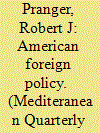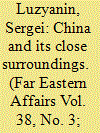| Srl | Item |
| 1 |
ID:
087845


|
|
|
|
|
| Publication |
2009.
|
| Summary/Abstract |
A new American president will now confront the extraordinary complexity of his country's foreign policy. Presidents, even without foreign affairs backgrounds, have already formed ideas about basic directions that the nation's international policies should take, and it is these fundamental inclinations to which this essay addresses itself, an essay divided into four parts: (1) types of foreign policy, (2) some recent examples of presidential choices about direction, (3) future possibilities for a new administration that entered office in January 2009, and (4) limitations on the foreign policy choices of the new president-the old bugaboo of priorities.
|
|
|
|
|
|
|
|
|
|
|
|
|
|
|
|
| 2 |
ID:
099575


|
|
|
|
|
| Publication |
2010.
|
| Summary/Abstract |
The article analyzes priorities in China's foreign policy. It examines certain aspects of the regional and bilateral relations of the PRC with Japan, North Korea, South Korea, the Russian Federation, Mongolia, Central Asia, ASEAN, India and Pakistan.
|
|
|
|
|
|
|
|
|
|
|
|
|
|
|
|
| 3 |
ID:
157635


|
|
|
|
|
| Summary/Abstract |
The authors examine the military economic expediency of kinetic energy weapons development for performing combat missions in armed conflicts, local and regional wars, and a large-scale conventional war. Basic assumptions and premises for determining the place and role of various kinetic energy weapons are formulated, and qualitative assessment of their development priorities to ensure Russian defense capabilities is proposed.
|
|
|
|
|
|
|
|
|
|
|
|
|
|
|
|
| 4 |
ID:
162215


|
|
|
|
|
| Summary/Abstract |
We test whether politicians’ communications shape their supporters’ policy priorities by conducting a field experiment in collaboration with several local elected officials. In the experiment, the officials sent out email messages to the constituents on their distribution lists. Half the constituents received messages where the official advocated for the priority of a given issue, while the other half received a placebo email. We surveyed the constituents one to two months before the message went out and again the week after the official sent the message. The experiment shows that politicians did not change citizens’ priorities in the desired direction. Moreover, citizens who received a message where the official indicated the issue was a priority were not more likely to act when invited to sign a petition on the issue. Elected officials’ ability to shape the priorities of the politically active citizens with whom they regularly communicate is limited and can even be self-defeating.
|
|
|
|
|
|
|
|
|
|
|
|
|
|
|
|
| 5 |
ID:
105377


|
|
|
|
|
| Publication |
2011.
|
| Summary/Abstract |
Surveys, experiments, large-N datasets and formal models are common instruments in the political scientist's toolkit. In-depth interviews and focus groups play a critical role in helping scholars answer important political questions. In contrast, participant observation techniques are an underused methodological approach. In this article, we argue that participant observation techniques have played and should continue to play a key role in advancing our understanding of political science. After demonstrating the use of these techniques, we offer readers advice for embarking upon participant observation research and explain how this approach should fit into a scholar's long-term career plans.
|
|
|
|
|
|
|
|
|
|
|
|
|
|
|
|
| 6 |
ID:
120031


|
|
|